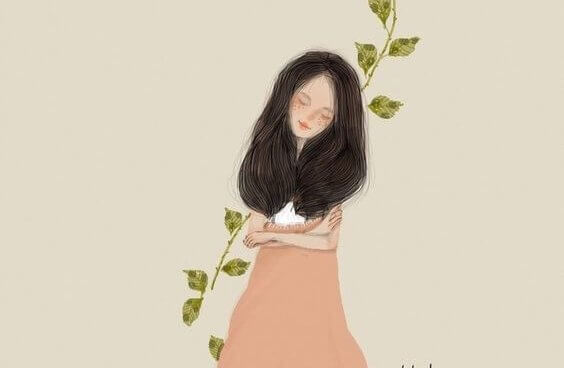Sometimes we settle for what doesn’t make us happy: by custom, by indecision, by fear. The heart rusts and the mind is held hostage to the limits of its comfort zone. Maybe we forget that being happy can be very easy. The most complicated thing is to know what is important, more constructive and magical for us, and then fight for it.
As the popular saying goes, “Is it so simple to be happy, but so hard to be simple?” Few sentences can contain such an obvious truth. To understand, let’s think of one thing for a moment. Most people are educated on the basis of the idea that certain things must be achieved to be defined, to achieve a status, to have qualities and skills adapted to an end.
“Happiness is not in possessions, nor in the amount of gold, happiness is in the soul. -Demócrit-
We study and graduate to get a job, we have a job to achieve a supposed well-being, we have obtained a number of resources and material goods, and we have established a series of social and emotional relationships that should supposedly bring us a lot of happiness However, this formula is not always correct, the factors do not match the end result.
Is happiness a lie? No way. The lie, in fact, is in the way we were taught to achieve happiness, because anyone who strives to seek this state of grace considering these factors will always fail, the pursuit of happiness never ends well for a very simple reason: happiness is a state of being. Happiness is not sought, it is created. Happiness is not found, you work. In addition, there is one thing that should not be overlooked: some strategies do not apply to each, each of us has to do this work in its own way.
From 2015 to today, there is a word found in any library: Hygge. The Danish miracle of being happy was a huge and impressive success, at least editorially. It invites us to achieve this full and true state of well-being through the purest and most basic simplicity that tries to free the conflicts of coexistence that we have with those we love.
Well, as curious as it may seem, today the term Hygge begins to be diluted to give way to new winds, complementary perspectives of itself, gathered in a new word: Lagom. Scandinavians bring us another trend that, as always, is embellished with beautiful images that summarizes a concept that seeks to spread instantly on Instagram.
Lagom can be translated as “to the right extent”. This leads us, for example, to seek the essential and the essential, to buy only what is necessary, to take care of the environment, to decorate the house with the essentials, to eat only what is necessary, without excess. It also reminds us of the importance of not letting work take over our lives, as we see, once again the idea that “Less is more” is repeated and what is happiness?And how could that not be?
However, if all these messages are positive and comforting, we cannot set aside all the marketing behind these trends. Nordic fever, with its excellent police novels, excellent lifestyle or social welfare continues to arouse our appeal, there is no doubt.
What exists, however, is also a somewhat bitter utopia. Is that why a rewarding and controversial study titled “Almost Perfect People”?From the Briton Michael Booth, in which he seeks to offer a realistic view of the apparent Nordic happiness, something that, in a way, could already be felt in Henning Mankell’s books.
One of the things that draws our attention most is the fact that the Nordic countries, apparently the happiest in the world, are at the top of the ranking of regions with the highest suicide rate, seems to be missing anything?
All these books on how to learn to be happy are interesting and recommended, offer us new perspectives, make us aware of things that we may not notice, invite us to think and, without a doubt, to try to make one or the other change. However, we must be aware that these are not instruction manuals or Bibles, which are not good for everyone because sometimes we live in very different realities.
“Happiness does not depend on external conditions, it is governed by our mental attitude. -Dale Carnegie-
Saying that work should not take over our lives does not make sense when, for example, we are looking for work, can’t we live with the minimum either? When what we have is already the main thing. With all this we want to clarify one thing: happiness is custom built, it must be our size and correspond to our particular realities.
Such a thing requires effort, will and understanding that being happy can be very easy, of which there is no doubt, but the tricky thing is to know clearly our priorities, which can be completely opposed to the priorities of others?courage, not an Instagram photo in which a woman reads a book with wool socks, glasses and a coffee next door.
Sometimes to be happy you have to leave everything and start over, start from scratch, other times you have to work hard on the inside, heal wounds, resolve frustrations and find new motivations. Let us be able to make the difficult easy. , but we also create our own recipe to be happy.

